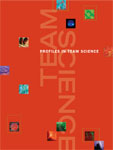Welcome to the website for "Profiles in Team Science,"
a project launched by
the National Science Foundation (NSF) Discovery Corps Program conducted by
Deborah L. Illman at the University of Washington.
This site contains information about the outcomes of the NSF Science and Technology Centers and complements a printed booklet on the same theme.
2012 Edition
2007 Edition
About This Project
Increasingly, researchers are tackling questions that transcend disciplinary boundaries, and federal agencies are creating new models for funding team science. Solving "big" problems in science generally requires big teams, big budgets, and a long time frame. It usually involves the collaboration of many different scientists and engineers from a wide variety of disciplines in the context of a research center or institute, which often attempts to integrate research with education, technology transfer efforts, outreach activities, and diversity enhancement programs.
Centers are proliferating, yet their outcomes may not be easily covered within the constraints of the news media. There's a news gap, and many members of the general public may not make the connection between the team mode of operation and the results produced. What is different about team science? How is it working? What can it accomplish that couldn't be done otherwise, if anything? Why is it important for people to know about centers?
This project explores those questions. It is aimed at increasing awareness about team science and of NSF centers in order for policymakers, the scientific community, members of industry, educators, and taxpayers to understand the role that these modes of science funding play in solving critical problems facing society.
The goal is to "put a face" on team science-to provide tangible and specific stories of the real people carrying out this work in order to give us an insight into the way science increasingly is conducted today.
About the Principal Investigator
Deborah Illman's recent research and teaching activities at the University of Washington have focused on science communication and public understanding of science and technology. Her research on accuracy in science news reporting previously has received support from the National Science Foundation. She organized and chaired a symposium at the 2004 annual meeting of the American Association for the Advancement of Science in Seattle on the subject of "Public Engagement with Engineering," and her research on media portrayals of engineers was the cover article of the spring 2006 issue of IEEE Technology & Society.
Illman is Founding Editor of Northwest Science & Technology Magazine and has been honored with 12 awards for science writing and editing in recent years. She is former Associate Editor of Chemical & Engineering News, the official news publication of the American Chemical Society. With a circulation of approximately 150,000, C&EN is the leading chemistry news magazine nationwide. Based first at the Washington D.C. headquarters and then serving as head of the magazine's West Coast Bureau, Illman covered topics in analytical, environmental, and industrial process chemistry in addition to anchoring chemical education for the magazine.
During 1988-89, she served as a Science, Engineering, and Diplomacy Fellow of the American Associate for the Advancement of Science.

